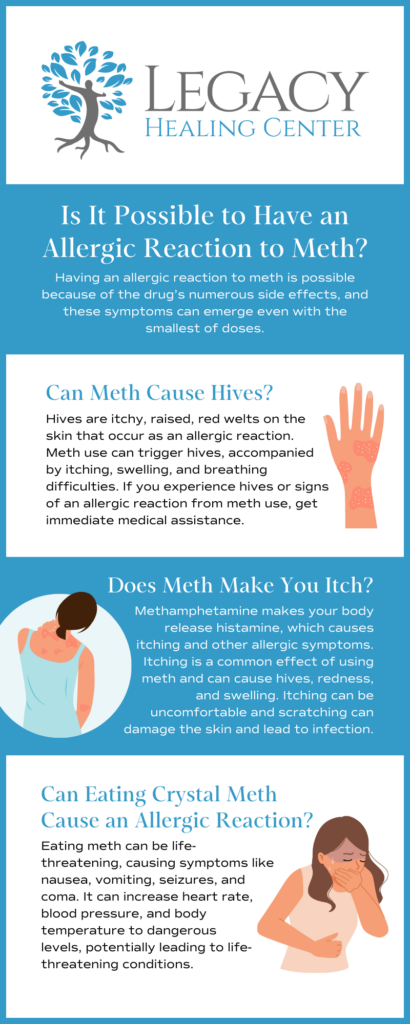
Allergic Reaction to Meth: All There Is to Know
Legacy Healing Center Blog
Is It Possible to Have an Allergic Reaction to Meth?
If you weren’t aware, having an allergic reaction to meth is possible because of the drug’s numerous side effects, and these symptoms can emerge even with the smallest of doses. At our rehab center, we understand that meth addiction is a complex and challenging problem that can have severe consequences for individuals and their loved ones. Surprising to many people is that one of the potential side effects of methamphetamine use is an allergic reaction. For many users, the first step to quitting methamphetamine use and recovering from side effects is with a meth detox. In addition to detox, our addiction treatment center provides levels of care like medication-assisted treatment, cognitive behavioral therapy, and more to support long-term recovery. Keep reading to learn more about what allergies to meth look like and how we can help.
Can you Get an Allergic Reaction from Eating Crystal Meth?
Crystal meth is a highly potent and addictive drug that can cause significant harm to the body and brain. Therefore, eating crystal meth can have severe consequences and is considered a potentially life-threatening situation.
When ingested, crystal meth can cause a range of symptoms, including nausea, vomiting, abdominal pain, seizures, and even coma. Methamphetamine can also cause a dangerous increase in heart rate, blood pressure, and body temperature, which can lead to heart failure, stroke, or other life-threatening conditions.
If you suspect someone has ingested crystal meth, seek medical attention immediately. The person may need urgent medical care to stabilize their vital signs and prevent further harm.
Understanding Allergic Reactions to Meth
What is an Allergic Reaction?
An allergic reaction occurs when your immune system overreacts to a substance it perceives as harmful, even if the substance itself might not typically cause harm. This reaction can cause symptoms ranging from mild (itchiness, rashes) to severe (anaphylaxis).
How Methamphetamine Interacts with the Body
Methamphetamine, a powerful stimulant, can trigger various physical responses due to its chemical properties. While it’s not inherently allergenic, it can provoke immune system responses in some individuals. This is often due to impurities in the drug, additives, or the body’s heightened sensitivity to meth’s effects.
Common Symptoms of Meth Allergies
- Skin Reactions: Meth can lead to itching, hives, or a rash, often due to histamine release or direct irritation from the drug or its byproducts.
- Respiratory Symptoms: Some individuals may experience nasal congestion, difficulty breathing, or swelling in the throat.
- Systemic Symptoms: Fatigue, nausea, or fever could indicate a more widespread immune response.
Identifying Symptoms of Allergic Reactions to Meth
Meth Itchy:
One of the most common reactions to meth is intense itching, often caused by the drug’s effect on nerve endings or skin dryness. This itching might be accompanied by visible scratches or sores from excessive scratching, leading to further irritation or infection.
Meth Hives:
Hives are raised, red, and itchy welts that appear suddenly on the skin. These may be caused by histamine release triggered by meth or its contaminants. Hives can appear anywhere on the body and may vary in size and severity.
Meth Rash:
A meth rash typically consists of red, inflamed patches of skin that may be dry, scaly, or accompanied by blisters. This rash could result from allergic reactions, poor hygiene associated with meth use, or meth’s direct impact on skin health.
When to Seek Medical Attention:
- If the itching, hives, or rash become severe or spread rapidly.
- If symptoms are accompanied by difficulty breathing, swelling, or dizziness, as these could indicate a life-threatening allergic reaction (anaphylaxis).
- Persistent or worsening symptoms even after discontinuing meth use.
This section provides foundational knowledge for users to understand the nature and severity of meth-related allergic reactions while aligning with the article’s empathetic tone.
Heal From Addiction with a Facility That Cares
Addiction to methamphetamine can cause a range of allergic reactions, including hives and itching. These reactions can be distressing and uncomfortable and may be accompanied by other symptoms such as swelling and difficulty breathing. If you or someone you know experiences any symptoms of an allergic reaction after using meth, seek medical attention immediately.
At Legacy Healing Center, we offer personalized addiction therapies that address the physical, emotional, and mental aspects of addiction. Our team of experienced healthcare providers and therapists is dedicated to helping individuals achieve long-term recovery and live healthy, fulfilling lives.
To learn more about our treatment center, contact us today and speak with one of our trained intake specialists’
FAQs About Allergic Reactions to Meth
What are the signs of an allergic reaction to a drug?
An allergic reaction to a drug can present in several ways, ranging from mild to severe. Common signs include skin reactions such as hives, itching, or a rash; swelling, particularly of the face, lips, tongue, or throat; breathing difficulties like wheezing or shortness of breath; and digestive issues, including nausea, vomiting, or diarrhea. Severe reactions, such as anaphylaxis, are medical emergencies and are characterized by difficulty breathing, a rapid drop in blood pressure, and loss of consciousness. If you suspect a drug allergy, seek medical attention immediately.
How do you know if you are allergic to a stimulant?
If you’re allergic to a stimulant medication, symptoms typically emerge soon after taking the drug. These may include skin symptoms such as hives, rash, or itching; respiratory issues like difficulty breathing, wheezing, or nasal congestion; gastrointestinal discomfort such as nausea, vomiting, or abdominal cramps; and systemic reactions like swelling, dizziness, or, in severe cases, anaphylaxis. Always report these symptoms to your healthcare provider. They may recommend stopping the medication or testing for specific allergies.
What does a drug rash look like?
Drug rashes can vary significantly but commonly appear as red, blotchy patches on the skin, raised areas or bumps similar to hives, flat or scaly patches that may peel, or localized or widespread areas of redness or irritation. Some rashes are itchy, while others may be tender or cause burning sensations. If a rash develops after taking a medication, consult a healthcare provider to determine its cause and severity.
How long does it take for a drug reaction rash to go away?
The duration of a drug reaction rash depends on its severity and whether the offending drug is discontinued. In most cases, mild rashes resolve within a few days to a week after stopping the drug. More severe rashes may take several weeks and may require treatment such as antihistamines or corticosteroids. If a drug rash persists or worsens, it is important to follow up with a healthcare professional to ensure proper care and recovery.
Related Readings:
- Does Heroin Affect the Brain?
- Drugs Requiring Medical Detox
- Pink Meth: The Reality of This Fruity Form of Meth
- Allergic Reaction to Meth: All There Is to Know
- How Long Does Meth Last in Your System?

